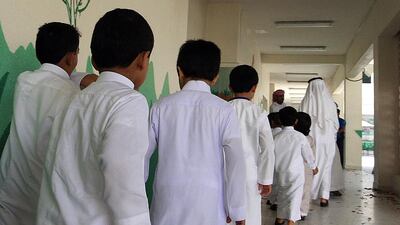Just this week, The National published an article saying that, according to a survey, "only half of children in Abu Dhabi feel safe at school". The headline haunted me all day as I thought of some of these kids having to go to school – a place where they are forced to go for most of their childhood – only to endure what are sometimes years of abuse and discomfort.
While I tend to be wary of surveys, I did not doubt that this statement was true. Despite having a generally pleasant experience at school, I remember having to be very calculating in my early years to avoid being picked on.
According to the study carried out by the Abu Dhabi Education Council, only about half of students in both state and public schools feel safe. In addition, a third of private school pupils said they “sustained bodily harm more than once at school" and almost 40 per cent said they had been bullied, ridiculed or verbally abused at least once.
The survey also found that nearly half of both state and private school students had seen other children “suffer bodily harm more than once". What was equally troubling to me was that many children had come to accept and believe that being bullied was normal. No one, especially a child, should believe that this is a part of daily life. This requires immediate attention.
Before anything else, schools are supposed to be a safe environment. Families trust that their children are being looked after and are receiving an education. Nowhere is going to be perfect, but a school shouldn’t be a place where children legitimately feel unsafe and it definitely should not be somewhere where children are at risk of bodily harm.
Having been children ourselves, we all know that getting adults involved in a bullying situation has the potential of making things worse. Physical harm needs to be stopped right away, but we cannot intervene in emotional or psychological bullying without also giving children the tools they need to empower themselves to deal with these situations. This is especially true in the age of technology, where the rise of cyberbullying means that children cannot always be protected and might need to fend for themselves. The responsibility is on us as adults to find solutions that will not make anyone vulnerable to more harassment.
It is just as crucial to try to understand why bullies behave the way they do. According to many studies, kids usually bully because they learn this behaviour at home. If anything, bullying is often a result of a greater issue such as neglect, being subjected to a physically or emotionally violent home environment, or being bullied by a family member or adult. Most bullies don’t understand how wrong their behaviour is. It’s important to remember that, in a lot of cases, bullying is considered a learned behaviour – which means it can be unlearned.
Children bully for many reasons, which is why we need to promote tolerance and kindness to the best of our ability. Generally, the easiest targets are those perceived to be “different”, and in a country that boasts 200 nationalities, we have to very deliberately and consciously establish that our differences are something to celebrate not to pick on.
This is why we need more education and awareness on this issue. It is not enough to say bullying is bad, but any comprehensive anti-bullying campaign needs to teach and reinforce values that we all hold dear, such as kindness, compassion and respect. In addition, any campaign needs to be ongoing and involve families, teachers, the community at large, and other children. At the end of the day, the message we should be sending to students should empower them to create a bully-free community, to stand up and support each other.
Children spend a lot of their lives in school, almost more than they spend at home, so we need to work as a society to ensure that their fundamental growth period/learning environment is one where fear is the last thing on their minds. After all, they do say it takes a village to raise a child.
Fatima Al Shamsi is a globetrotting Emirati foodie, film buff and football fanatic

